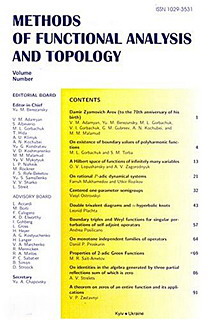Vol. 12 (2006), no. 3
Higher powers of q-deformed white noise
MFAT 12 (2006), no. 3, 205-219
205-219
We introduce the renormalized powers of $q$-deformed white noise, for any $q$ in the open interval $(-1,1)$, and we extend to them the no--go theorem recently proved by Accardi--Boukas--Franz in the Boson case. The surprising fact is that the lower bound ( ef{basicineq}), which defines the obstruction to the positivity of the sesquilinear form, uniquely determined by the renormalized commutation relations, is independent of $q$ in the half-open interval $(-1,1]$, thus including the Boson case. The exceptional value $q=-1$, corresponding to the Fermion case, is dealt with in the last section of the paper where we prove that the argument used to prove the no--go theorem for $q \ne 0$ does not extend to this case.
Borg-type theorems for generalized Jacobi matrices and trace formulas
MFAT 12 (2006), no. 3, 220-233
220-233
The paper deals with two types of inverse spectral problems for the class of generalized Jacobi matrices introduced in [9]. Following the scheme proposed in [5], we deduce analogs of the Hochstadt--Lieberman theorem and the Borg theorem. Properties of a Weyl function of the generalized Jacobi matrix are systematically used to prove the uniqueness theorems. Trace formulas for the generalized Jacobi matrix are also derived.
$\nabla$-Fredgolm operators in Banach-Kantorovich spaces
MFAT 12 (2006), no. 3, 234-242
234-242
The paper is devoted to studying $\nabla$-Fredholm operators in Banach--Kantorovich spaces over a ring of measurable functions. We show that a bounded linear operator acting in Banach--Kantorovich space is $\nabla$-Fredholm if and only if it can be represented as a sum of an invertible operator and a cyclically compact operator.
Finite rank self-adjoint perturbations
MFAT 12 (2006), no. 3, 243-253
243-253
Finite rank perturbations of a semi-bounded self-adjoint operator $A$ are studied. Different types of finite rank perturbations (regular, singular, mixed singular) are described from a unique point of view and by the same formula with the help of quasi-boundary value spaces. As an application, a Schr\"{o}dinger operator with nonlocal point interactions is considered.
A note on one decomposition of Banach spaces
MFAT 12 (2006), no. 3, 254-257
254-257
For a scalar type spectral operator $A$ in complex Banach space $X$, the decomposition of $X$ into the direct sum \begin{equation*} X=\ker A\oplus \overline{R(A)}, \end{equation*} where $\ker A$ is the kernel of $A$ and $\overline{R(A)}$ is the closure of its range $R(A)$ is established.
Boundary triplets and Krein type resolvent formula for symmetric operators with unequal defect numbers
MFAT 12 (2006), no. 3, 258-280
258-280
Let $H$ be a Hilbert space and let $A$ be a symmetric operator in $H$ with arbitrary (not necessarily equal) deficiency indices $n_\pm (A)$. We introduce a new concept of a $D$-boundary triplet for $A^*$, which may be considered as a natural generalization of the known concept of a boundary triplet (boundary value space) for an operator with equal deficiency indices. With a $D$-triplet for $A^*$ we associate two Weyl functions $M_+(\cdot)$ and $M_-(\cdot)$. It is proved that the functions $M_\pm(\cdot)$ posses a number of properties similar to those of the known Weyl functions ($Q$-functions) for the case $n_+(A)=n_-(A)$. We show that every $D$-triplet for $A^*$ gives rise to Krein type formulas for generalized resolvents of the operator $A$ with arbitrary deficiency indices. The resolvent formulas describe the set of all generalized resolvents by means of two pairs of operator functions which belongs to the Nevanlinna type class $\bar R(H_0,H_1)$. This class has been earlier introduced by the author.
A locally convex quotient cone
Asghar Ranjbari, Husain Saiflu
MFAT 12 (2006), no. 3, 281-285
281-285
We define a quotient locally convex cone and verify some topological properties of it. We show that the extra conditions are necessary.
On similarity of convolution Volterra operators in Sobolev spaces
MFAT 12 (2006), no. 3, 286-295
286-295
Necessary and sufficient conditions for a convolution Volterra operator to be similar in a Sobolev space to the operator $J^\alpha$ are obtained. A criterion of similarity is obtained as well.
On enveloping $C^*$-algebra of one affine Temperley-Lieb algebra
MFAT 12 (2006), no. 3, 296-300
296-300
$C^*$-algebras generated by orthogonal projections satisfying relations of Temperley-Lieb type are constructed.


